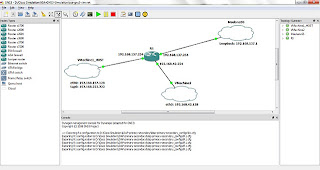In this article, I will show you how to emulate Cisco ASA using Qemu. Once again, please note that ASA is not provided and will not be. So please don’t ask. Also be aware that ASA does not 100% work in Qemu but that’s enough to play with it.
Installation
First compile and patch Qemu as you would do for running JunOS. This will give us pcap, lcap and UDP tunnels (i.e. GNS3/Dynamips connections) capabilities.
Then obtain ASA itself. If you are smart and patient you will find it. I used asa802-k8.bin for my installations. As far as I know, nobody has been able to run ASA > version 8.2 (ASA keeps rebooting).
The next step is to get an initrd and a Linux kernel (inside the initrd) from your ASA image to use them with Qemu and also fix the initrd for our needs. The initrd is zipped and archived in the ASA image, we have to extract it.
There are 2 ways, manually or using a tool I created.
Manual methodFirst compile and patch Qemu as you would do for running JunOS. This will give us pcap, lcap and UDP tunnels (i.e. GNS3/Dynamips connections) capabilities.
Then obtain ASA itself. If you are smart and patient you will find it. I used asa802-k8.bin for my installations. As far as I know, nobody has been able to run ASA > version 8.2 (ASA keeps rebooting).
The next step is to get an initrd and a Linux kernel (inside the initrd) from your ASA image to use them with Qemu and also fix the initrd for our needs. The initrd is zipped and archived in the ASA image, we have to extract it.
There are 2 ways, manually or using a tool I created.
Create an hexadecimal dump of your image:
Search for the ZIP header:
We can see that the ZIP file starts at offset 1228b0.
Let’s find the image size:
Now we need to find out where in the file we can start extracting the ZIP part.
Extract the zipped part of the ASA image:
Decompress it with gzip:
Make a temp directory and go into it so we can extract the files contained in the uncompressed archive file (the initrd):
Now extract the archive with cpio (you must have the administrator rights to successfully extract device files).
Copy the Linux kernel to your previous directory:
Before compressing back the initrd, create the following script in asa/scripts/first_start.sh
This script formats the 256 MB flash on first start to be used by ASA. Loads the network drivers modules for Intel e100 (i82559er in Qemu) and Intel e1000 cards and activates the network interfaces to be used in ASA. I noticed that if we immediately start ASA after this first boot, it freezes (don’t really know why but it seems the system do something and slow down during the first minute …). The next time you start the system, the script will still load the activate the network interfaces and automatically start ASA.
This script formats the 256 MB flash on first start to be used by ASA. Loads the network drivers modules for Intel e100 (i82559er in Qemu) and Intel e1000 cards and activates the network interfaces to be used in ASA. I noticed that if we immediately start ASA after this first boot, it freezes (don’t really know why but it seems the system do something and slow down during the first minute …). The next time you start the system, the script will still load the activate the network interfaces and automatically start ASA.
In order for the script to be loaded at startup, edit etc/init.d/rcS and change /asa/bin/lina_monitor by /asa/scripts/first_start.sh
Change first_start.sh permissions:
Now you can compress all the file and have the initrd ready to use in Qemu:
Automated extraction method
TODO
Using ASA with Qemu
Create a FLASH (this is a virtual hard disk).
Then you can start Qemu.
TODO: networking of ASA. Very similar with JunOS emulation.
Using ASA with GNS3
To be completed:
In Preferences -> Qemu -> Qemuwrapper section:
Set the path to Qemuwrapper (can be found in the GNS3 package)
Set the working directory (e.g. /tmp).
Set the path to your patched Qemu in “Path to Qemu”
In ASA section:
Set the paths to your initrd and kernel.
Drag and Drop an ASA symbol on the scene, start the firewall and telnet to it.

No comments:
Post a Comment